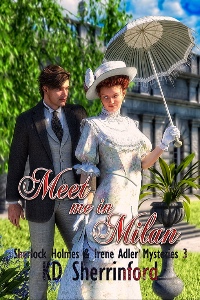Charlotte Sapori has led a wonderful life, safely tucked in the bosom of her family. Her mother, Irene Adler, is a renowned opera singer, while her father, Lucca Sapori, does important government work that frequently takes him away from them. Charlotte is close to her older brother, Nicco, and they are both doted on by their parents. All is well until her mother receives an unexpected diagnosis which shakes the family to its core.
Knowing herself to be dying, Adler confesses to Charlotte things that have long been kept from her, telling her to find and read her diary. A distressed Lucca Sapori tells his daughter to read his as well. And by the way, Lucca Sapori is not his real name. In fact, she may have heard of him—he is actually the world-famous detective, Sherlock Holmes.
Charlotte finds both diaries and plunges into the hidden world of Irene Adler and Sherlock Holmes as she discovers what brought them together, and how they managed to stay together for thirty years despite having to battle the odds.

It’s strange how two words can turn your world upside down.
I had no way of knowing that the witness to my wedding to the lawyer Godfrey Norton would come back to haunt me in years to come. My cousin Estelle once told me that the true love of one’s life is the one who catches you unaware and changes you inexplicably.
I was in my late twenties when I moved to London in 1887, having spent the past few years performing as a contralto at La Scala in Milan, and then a term as prima donna with the Imperial Opera of Warsaw. And it was in Warsaw where I first met Wilhelm Gottsreich Sigismond von Ormstein, Grand Duke of Cassel-Feldstein, the hereditary king of Bohemia.
I suppose it all sounds rather grand, given his title, but Wilhelm was a kind, fun-loving man, and a huge fan of the opera. A big man, in every sense of the word, he was a tall, imposing figure—well-built with broad shoulders and a muscular frame, black hair, sparkling brown eyes, and a handlebar moustache. He would often make a grand entrance with his entourage, insisting the cast join him for drinks afterwards. They all adored him, of course. He was thoughtful and generous. So I thought little of it when a bouquet of flowers appeared in my dressing room every night.
A few months after meeting Wilhelm, I was invited and accepted into the elitist fold of La Scala’s theatre chorus. My dream had always been to train at the prestigious Opera House. Wilhelm took the news badly. He told me he’d developed feelings for me, and while I had grown very fond of him, I knew I had to follow my dreams. Looking back, enrolling at La Scala was one of the happiest moments of my life. But then I gave it up for the position of prima donna at the Grand Opera House in Warsaw, which was the worst decision of my life.
A few weeks after my arrival in Warsaw, a letter from Wilhelm revealed he had returned to the city upon learning of my new appointment and asked if he could take me to luncheon. I accepted the invitation. In truth I was looking forward to seeing Wilhelm again. I missed his infectious humour and I hoped we could remain friends. We spent a lovely morning together and laughed watching the waiters scurry around, eager to please him. His disposition and exuberant personality were so endearing, always the life and soul of the party. I was always aware he held a torch for me, but I was taken aback when he declared his undying love and his intention to make me his wife. I was speechless, swept away by the excitement of it all until I came to my senses.
“No.” I shook my head. “This can’t be. Your parents would never allow it.”
Wilhelm became animated, insisting he would be king one day and could choose his own bride. Although I was young and naïve, I knew the matter was not that simple. Wilhelm claimed he would speak to his parents, confident they would listen to reason. He pleaded with me to be patient
More than four weeks passed before I received a letter informing me of his failed attempts to win over his parents. His father was so enraged at the absurd prospect that he ordered Wilhelm to propose to Clotide Lothman von Saxe-Meiningen, the second daughter to the king of Scandinavia. There was no apology. Wilhelm even had the audacity to suggest I become his mistress and, to add insult to injury, demanded the return of a photograph he’d had taken of us.
Incensed at the disrespect I’d been shown, I decided to retire from the stage and move to London. They say hell hath no fury like a woman scorned. In an act of foolishness, which I later regretted, I told Wilhelm I intended to send the photograph to Clotide’s family should the engagement be announced. This was admittedly scandalous behaviour, but I was young and I and had never experienced rejection. I still remember the feelings of anger, betrayal, and jealousy, as though I’d felt them only yesterday—they were all-consuming.
Wilhelm’s response was to send his agents after me. Upon my arrival in London, I was searched at Charing Cross station before my house in St John’s Wood was broken into. Wilhelm’s pursuit of the photograph was relentless, although I was always one step ahead of him. Before I left Warsaw, I arranged with a friend to post the photograph, which was addressed to my agent in London, secreted in the sleeve of a book. I kept it in a secure hiding place, one I was certain Wilhelm’s agents would never find.
It was around this time I went to see my old friend, Sarah Burton, who was performing as Desdemona in Shakespeare’s Othello at the Theatre Royal on Drury Lane. After the performance, she invited me to join her and a few friends for dinner at Rules in Covent Garden. And that was where I was introduced to Godfrey Norton. He was a dashing man—tall, dark—and I was instantly taken with him. Godfrey was neither vain nor arrogant, an attentive listener with a talent for putting those around him at ease. I told him about Wilhelm and what had transpired, but that did little to dampen his ardour. On the contrary, Godfrey pursued me relentlessly over the coming weeks. He sent me flowers and frequently escorted me to the theatre and dinner. During the day we enjoyed long leisurely strolls through the park, at which times Godfrey spoke incessantly of his hopes and dreams, his plans for the future—plans which he said included me.




